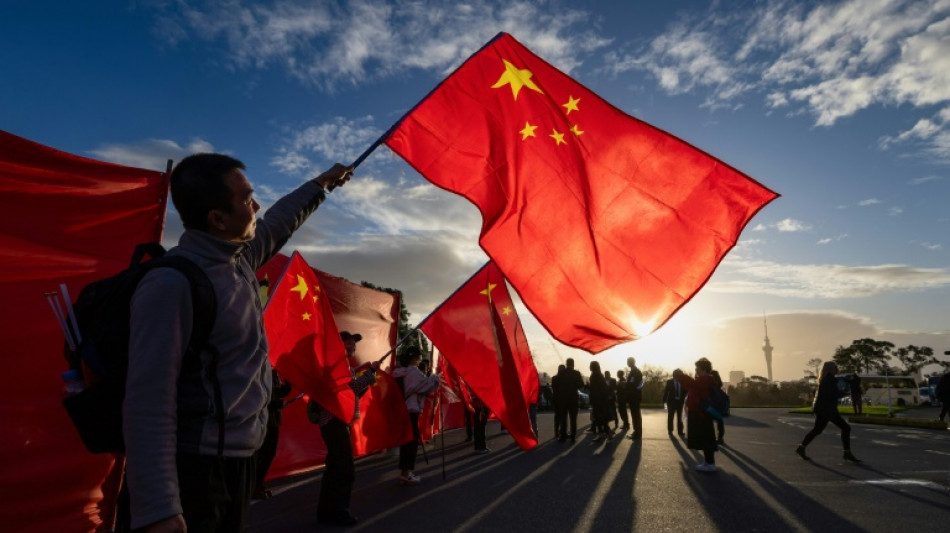
-
 'Veggie burgers' face grilling in EU parliament
'Veggie burgers' face grilling in EU parliament
-
Trio wins physics Nobel for quantum mechanical tunnelling

-
 Two years after Hamas attack, Israelis mourn at Nova massacre site
Two years after Hamas attack, Israelis mourn at Nova massacre site
-
German factory orders drop in new blow to Merz

-
 Man City star Stones considered retiring after injury woes
Man City star Stones considered retiring after injury woes
-
Kane could extend Bayern stay as interest in Premier League cools

-
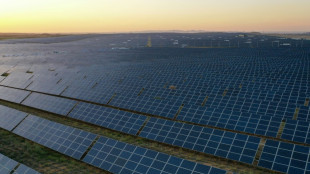 Renewables overtake coal but growth slows: reports
Renewables overtake coal but growth slows: reports
-
Extreme rains hit India's premier Darjeeling tea estates

-
 Raducanu retires from opening match in Wuhan heat with dizziness
Raducanu retires from opening match in Wuhan heat with dizziness
-
UK's Starmer condemns pro-Palestinian protests on Oct 7 anniversary

-
 Tokyo stocks hit new record as markets extend global rally
Tokyo stocks hit new record as markets extend global rally
-
Japan's Takaichi eyes expanding coalition, reports say
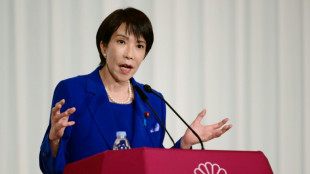
-
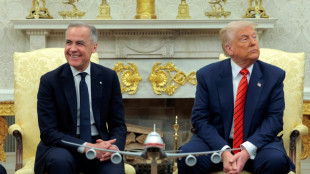 Canadian PM to visit White House to talk tariffs
Canadian PM to visit White House to talk tariffs
-
Indonesia school collapse toll hits 67 as search ends

-
 Dodgers hold off Phillies, Brewers on the brink
Dodgers hold off Phillies, Brewers on the brink
-
Lawrence sparks Jaguars over Chiefs in NFL thriller

-
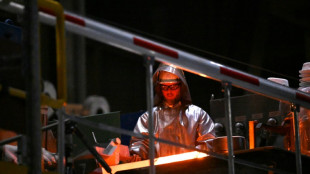 EU channels Trump with tariffs to shield steel sector
EU channels Trump with tariffs to shield steel sector
-
Labuschagne out as Renshaw returns to Australia squad for India ODIs

-
 Open AI's Fidji Simo says AI investment frenzy 'new normal,' not bubble
Open AI's Fidji Simo says AI investment frenzy 'new normal,' not bubble
-
Tokyo stocks hit new record as Asian markets extend global rally

-
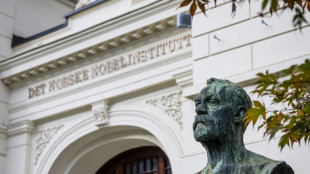 Computer advances and 'invisibility cloak' vie for physics Nobel
Computer advances and 'invisibility cloak' vie for physics Nobel
-
Nobel literature buzz tips Swiss postmodernist, Australians for prize

-
 Dodgers hold off Phillies to win MLB playoff thriller
Dodgers hold off Phillies to win MLB playoff thriller
-
China exiles in Thailand lose hope, fearing Beijing's long reach
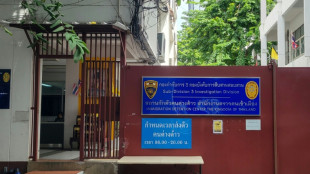
-
 Israel marks October 7 anniversary as talks held to end Gaza war
Israel marks October 7 anniversary as talks held to end Gaza war
-
Indians lead drop in US university visas

-
 Colombia's armed groups 'expanding,' warns watchdog
Colombia's armed groups 'expanding,' warns watchdog
-
Shhhh! California bans noisy TV commercials

-
 HotelRunner and Visa Partner Globally to Power Embedded and Autonomous Finance in Travel
HotelRunner and Visa Partner Globally to Power Embedded and Autonomous Finance in Travel
-
Trump 'happy' to work with Democrats on health care, if shutdown ends
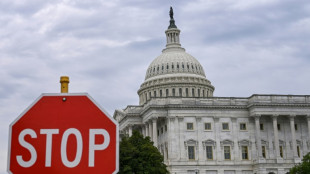
-
 Trump says may invoke Insurrection Act to deploy more troops in US
Trump says may invoke Insurrection Act to deploy more troops in US
-
UNESCO board backs Egyptian for chief after US row

-
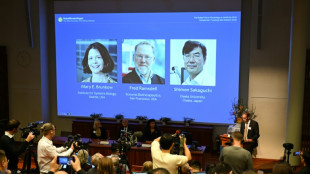 Unreachable Nobel winner hiking 'off the grid'
Unreachable Nobel winner hiking 'off the grid'
-
Retirement or marketing gimmick? Cryptic LeBron video sets Internet buzzing

-
 CAF 'absolutely confident' AFCON will go ahead in protest-hit Morocco
CAF 'absolutely confident' AFCON will go ahead in protest-hit Morocco
-
Paris stocks slide amid French political upheaval, Tokyo soars
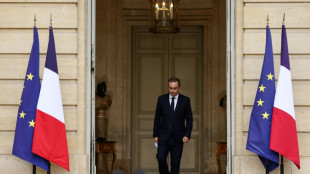
-
 EU should scrap ban on new combustion-engine sales: Merz
EU should scrap ban on new combustion-engine sales: Merz
-
US government shutdown enters second week, no end in sight
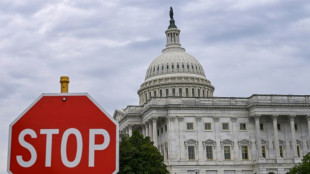
-
 World MotoGP champion Marquez to miss two races with fracture
World MotoGP champion Marquez to miss two races with fracture
-
Matthieu Blazy reaches for the stars in Chanel debut

-
 Macron gives outgoing French PM final chance to salvage government
Macron gives outgoing French PM final chance to salvage government
-
Illinois sues to block National Guard deployment in Chicago

-
 Exiled Willis succeeds Dupont as Top 14 player of the season
Exiled Willis succeeds Dupont as Top 14 player of the season
-
Hamas and Israel open talks in Egypt under Trump's Gaza peace plan

-
 Mbappe undergoing treatment for 'small niggle' at France camp: Deschamps
Mbappe undergoing treatment for 'small niggle' at France camp: Deschamps
-
Common inhalers carry heavy climate cost, study finds

-
 Madagascar president taps general for PM in bid to defuse protests
Madagascar president taps general for PM in bid to defuse protests
-
UEFA 'reluctantly' approves European league games in US, Australia

-
 Hundreds protest in Madagascar as president to announce new premier
Hundreds protest in Madagascar as president to announce new premier
-
Greta Thunberg lands in Greece among Gaza flotilla activists deported from Israel


New Zealand spy service warns of China interference
New Zealand's spy service warned Thursday that China is the most active power engaging in foreign interference in the country, including through front organisations.
New Zealand faces the "most challenging national security environment of recent times", the country's intelligence agency said in an annual risk assessment.
Key drivers of the deteriorating threat environment were less stable relationships between states, deepening polarisation and growing grievances.
Though several states seek to manipulate New Zealand's government and society, China remains the "most active", the New Zealand Security Intelligence Service said.
The spy agency specifically accused China's United Front Work Department of engaging in foreign interference to build influence outside of China.
Not all of its activity amounted to foreign interference, and some could be beneficial, it said.
"However, its activities are regularly deceptive, coercive and corruptive and come with risks for New Zealand organisations."
The agency cautioned New Zealand businesses that under China's national security legislation, individuals and organisations in China must comply with requests from the country's security services.
The Indo-Pacific region is a focal point for strategic competition between powers, the security service said.
- Undetected espionage -
China is a "particularly assertive and powerful actor", seeking to extend and embed its influence across the region, the report said.
"It has demonstrated both a willingness and capability to undertake intelligence activity that targets New Zealand's national interests."
Without naming countries, the intelligence service highlighted the routine use of "transnational repression" by foreign states, often by co-opting people to collect information about someone within their own diaspora living in New Zealand.
Looking at other risks, the agency said the most plausible extremist threat in New Zealand remained that of a lone actor, radicalised in an increasingly polarised, grievance-laden online world, who attacks without forewarning.
Young and vulnerable people were at the highest risk of radicalisation, it said.
"Increasing levels of polarisation and grievance are driving support for violent extremist ideologies and foreign states are more willing to target New Zealand organisations and communities in order to achieve their aims," director-general of security Andrew Hampton said.
"These threats are worthy of greater attention."
It is "almost certain" some foreign espionage activity is going undetected, the service said, reporting the targeting of critical organisations, infrastructure and technology -- mostly through cyber exploitation.
"It is not just intelligence officers conducting this activity," the agency said.
"Some governments take a 'whole of state approach' to intelligence gathering, which includes utilising businesses, universities, think tanks, or cyber actors to act on their behalf."
Global competition and insecurity drive most of the espionage activity against New Zealand, it said.
The service cited "multiple examples" of states seeking covert access to information on government policy positions, security partnerships, technological innovations and research.
L.Maurer--VB
